现代英语词汇学概论最强版复习资料chapter8
现代英语词汇学概论8 Meaning and Context

The meaning of make is affected by the grammatical structures. This is called grammatical context. Grammatical context is the grammatical structures in which a particular linguistic item is used.
[47] The ball was good. 1) dancing party 2) round object Revised: The ball was good. I never danced like this before. The ball was good. I used it for a long time.
8.1.2 Linguistic Context
figure 1) a half-length figure (像) 2) a historical figure (人物) 3) double figure (数字) 4) figure of speech (词格)
8.1.2 Linguistic Context
8.1.1 Extra-linguistic Context
广场(square) 1) a large flat area without buildings 2) a large building (亚贸广场;武广) 城(city) 1) a large town with more than 300,000 residents 2) 家俱城;书城
8.1.1 Extra-linguistic Context
现代英语词汇学
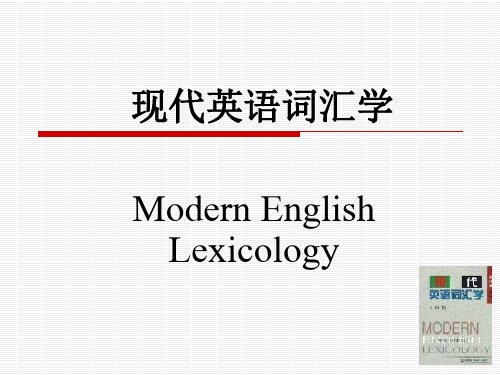
第八章:英语习语 English Idioms
III. 英语习语的整体与结构成分之间的语义关系
2. 习语的意义和构成这个习语的词的意义有一定联系 常带有隐喻和明喻色彩
to stab in the back 在背后用匕首此人——暗箭伤人 a dog in the manger 占着马槽的狗——占着茅坑不拉屎的人 to kill two birds with one stone —— 一石二鸟、 一箭双雕
第八章:英语习语 English Idioms
Examples:
under the weather leave in the air使…悬而未决 do up brown 把…彻底搞好 show the white feather显示胆怯 diamond cut diamond Rank and file 普通成员
第八章:英语习语 English Idioms
4. 副词性习语
heart and soul 全心全意(N+ and + N) bag and baggage 完全地 in a breeze 轻而易举地 (prep + N) with a flying colors 出色地 between the devil and the deep blue sea 进退维谷 (prep +N+ and +N)
第八章:英语习语 English Idioms
II. 英语习语的分类 1. 动词习语
1)动词+小品词
They tried to find ways of getting round (逃避)the tax laws. (V + prep) He is letting himself in for (使…陷于…) trouble. (v+ adv+ prep) He could hardly sit down under (忍受)that kind provocation. (v+ adv+ prep)
英语词汇学课件 Unit 8

三个角度:词义范围、词义褒贬、词义转移
8.2 Semantic broadening and narrowing
8.2.1 Semantic broadening 8.2.1.1 definition
semantic broadening (the widening/ extension/generalization of meaning) : the word takes on a wider, more general meaning than it had previously. E.g. the meaning of bird, formerly ‘young bird’, was extended, in the early history of English, to mean ‘bird’ in general. mill/journal/bonfire/butcher/companion
8.2.1.2 different types of broadening 从特指到泛指: sun “江” 、“河” 从具体到抽象: place, thing(a public assembly, Old English and Old Norse / an entity of any kind) circumstance 从术语到一般词语 allergic, feedback 从专有名词到普通名词 sandwich newton ampere
8.3.2 semantic degradation
the degradation/degeneration/pejoration of meaning: Change by which a word develops a less favorable sense.
英语词汇学 第八章课件详细版.ppt

8.2 The Role of Context: 语境的作用
❖ 1.Elimination of Ambiguity. Ambiguity often arises due to polysemy and homonymy. 消除歧义。由于词的多义词和 同音同形异义性,歧义现象经常出现。
❖ Grammatical structure can also lead to ambiguity. 语法结构也会引起歧义。
11
❖ 4) Synonymy.同义词关系 ❖ Synonyms or synonymous expressions
are frequently employed by authors to explain new words. 作家们频繁地使用同义词或同义词组来解释 新词 。
12
❖ 5) Antonymy.反义关系 ❖ Contrasting words or statements are also
6
8.2.2 Indication of Referents.限定所指
7
8.2.3 Provision of Clues for Inferring Word-meaning 提供推断词义的线索
❖ In many cases, when a new word (thought to be) appears for the first time, the author generally manages to give hints which might help the readers to grasp the concept or understand the idea. 在很多情形中,当一个新词(所谓的)第一 次出现时,作者一般会想方设法提供一些可 能帮助读者抓住概念或理解观点的暗示。
英语词汇学复习提纲
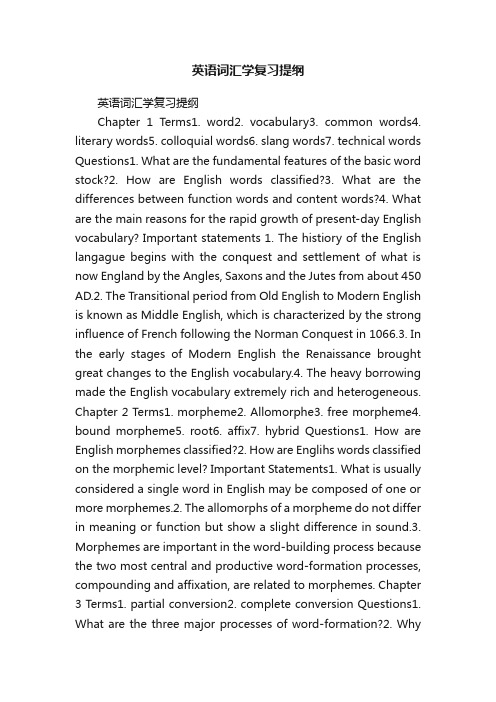
英语词汇学复习提纲英语词汇学复习提纲Chapter 1 Terms1. word2. vocabulary3. common words4. literary words5. colloquial words6. slang words7. technical words Questions1. What are the fundamental features of the basic word stock?2. How are English words classified?3. What are the differences between function words and content words?4. What are the main reasons for the rapid growth of present-day English vocabulary? Important statements 1. The histiory of the English langague begins with the conquest and settlement of what is now England by the Angles, Saxons and the Jutes from about 450 AD.2. The Transitional period from Old English to Modern English is known as Middle English, which is characterized by the strong influence of French following the Norman Conquest in 1066.3. In the early stages of Modern English the Renaissance brought great changes to the English vocabulary.4. The heavy borrowing made the English vocabulary extremely rich and heterogeneous. Chapter 2 Terms1. morpheme2. Allomorphe3. free morpheme4. bound morpheme5. root6. affix7. hybrid Questions1. How are English morphemes classified?2. How are Englihs words classified on the morphemic level? Important Statements1. What is usually considered a single word in English may be composed of one or more morphemes.2. The allomorphs of a morpheme do not differ in meaning or function but show a slight difference in sound.3. Morphemes are important in the word-building process because the two most central and productive word-formation processes, compounding and affixation, are related to morphemes. Chapter 3 Terms1. partial conversion2. complete conversion Questions1. What are the three major processes of word-formation?2. Whyare the criteria of a compound relative? Important Statements1. There are varioius ways of forming words, but by and large, the various processes can be classified on the basis of frequency of usage, into major or minor processes.2. Any rule of word formation is of limited productivity in the sense that not all words which result from the applicationn of the rule are acceptable; they are freely acceptable only when they have gained an institutional currency in the language.3. Prefixes modify the lexical meaning of the base. They do not genearlly alter the word-class of the base.4. Suffixes usually change the word-class of the base. Chapter 4 Terms1. blending2. back-formation3. clipp ing4. neoclassical formation Questions1. What are the differences between initialisms and acronyms? Important Statements1. On the whole, clipped words are used in less formal situations than their full-length equivalents.2. Most of the blends are related to daily life.3. The majority of backformed words are verbs.4. Reduplicatives are characterized by being rhymed or alliterated.5. The majority of neoclassical formations are scientific and technical.6. Genuine coinage is rare.7. Some new words are coined by analogy. Chapter 5 Terms1. motivation2. denotative meaning3. connotative meaning4. stylistic meaning5. affective meaning Questions1. What is the relationship between word form and its senses?2. What are the main types of word meaning? Important Statements1. The test of a genuinely onomatopeic word is its intelligibility to a foreigner who has no knowledge of the language in question.2. Denotative meaning is the central factor in linguistic communication.3. Lexical meaning is dominant in content words, whereas grammatical meaning is dominant in funciton words. Chapter 6 Terms1. radiation2. concatination3. prima ry meanin4. central meaning5. perfect homonyms6.homophones7. homographs Important Statements1. One-meaning words are very rare. They are very often scientific terms.2. It may be said that polysemy is the rule and monosemy is the exception.3. In some cases, the primary meaning and the central meaning coincide.4. Polysemic words and homonymous words are not only good candidates for humor, they can also produce other effects such as irony or heightened dramatic power. Chapter 7Terms1. complete synonyms2. relative synonyms3. hyponymy4. marked member5. unmarked member Questions1. In what respects do synonymous words differ? Important Statements1. An agreement in denotation is the most important criterion of synonymy.2. Two words aretotally synonymous only if they are fully identical in meaning and interchangeable in any context without the slightest alteration in connotative, affective and stylistic meanings.3. It is important to note that two forces militate against complete synonymy: vagueness of word meaning,and connotative, stylistic and affective meanings that cluster around words.4. In most cases the native word is more spontaneous, more informal and unpretentious, whereas the foreign word is learned, abstract or even abstruse.5. In the double scale pattern of synonyms the native term usually sounds warmer and more homely than its foreign counterpart.6. In the triple scale pattern of synonyms the difference in tone between the English and the French words is often slight; the Latin word is generally more bookish.7. Synnonyms are useful for avoiding repetition and for achieving precision in meaning and variety in style.8. Lexical antonymy is often stronger than syntactic negation.9. This semantic category obviously overlaps with hyponymy: both are involved with forming relaionships between words in the same general area ofmeaning. For parctical purposes, in the case of hyponymy, one should pay attention to the question of which specific term to use, while in the case of semantic field, one’s attention should be turned toward the highly probable collocations the words of each semantic field have in common. Chapter 8 Terms1. linguistic context2. ambiguity Questions1. What are the different types of context?2. What are the functions of context in determination of word meaning? 3. What are the different types of ambiguity? Important Statements1. When we say that the context determines the sense we mean not that it imposes a sense but that it selects one that is already there.2. Words rarely can be equated on a one-to-one basis between two languages. Chapter 9 Terms1. historical cause of changes in word meaning2. social cause of changes in word meaning3. linguistic cause of changes in word meaning4. psychological cause of changes in word meaning5. metaphor6. metonymy Questions1. What are the mian causes of changes in word meaning?2. What are the tendencies in semantic change? Important Statements1. Usually a literal meaning of a word remains along with a new metaphorical one.2. Broading speaking, change of meaning refers tothe alteration of the meaning of existing words, as well as the additionnn of new meaning to established words. Chapter 10Terms Idiom Question What points should we attention to if we want to use idioms appropriately? Chapter 11 Questions1. What are three stages in the growth of American English?2. What are the characteristics of American English? Chapter 12Terms1. prescriptive dictionaries 2. descriptive。
《英语词汇学》知识点归纳-(最新版)

English Lexicology(英语词汇学)Lexicology(词汇学): is a branch of linguistics, inquiring into the origins and meanings of words.The Nature and Scope of English lexicology:English lexicology aims at investigating and studying the morphological structures of English words and word equivalents, their semantic structures, relations, historical development, formation and usages.The subjects that English Lexicology correlated with and extent to:English Lexicology is correlated with such linguistic disciplines as morphology(形态学), semantics(语义学), etymology(词源学),stylistics(文体论)and lexicography(词典学) The reason for a student to study English lexicology:According to the textbook, English Lexicology will definitely be beneficial for students of English.A good knowledge of morphological structures of English words and rules of word-formation will help learners develop their personal vocabulary and consciously increase their word power. The information of the historical development and the principles of classification will give them a deeper understanding of word-meaning and enable them to organize, classify and store words more effectively. The understanding and their sense relations will gradually raise their awareness of meaning and usage, and enable them use words more accurately and appropriately. A working knowledge of dictionaries will improve their skills of using reference books and raise their problem-solving ability and efficiency of individual study.Chapter 1--Basic concepts of words and vocabularyWord(词的定义): A word is a minimal free form of a language that has a given sound and meaning and syntactic function. (1)a minimal free form of a language (2)a sound unity (3)a unit of meaning (4)a form that can function alone in a sentenceSound and meaning(声音与意义): almost arbitrary, “no logical relationship between the sound which stands for a thing or an idea and the actual thing and idea itself”Sound and form(读音和形式):不统一的四个原因(1)the English alphabet was adopted from the Romans,which does not have a separate letter to represent each other (2)the pronunciation has changed more rapidly than spelling over the years (3)some of the difference were creates by the early scribes(4)the borrowings is an important channel of enriching the English vocabularyVocabulary(词汇): all the words in a language make up its vocabularyClassification of English Words:By use frequency:basic word stock&nonbasic vocabularyBy notion:content words&functional wordsBy origin:native words&borrowed wordsThe basic word stock(基本词汇): is the foundation of the vocabulary accumulated over centuries and forms the common core of the language. Though it constitute a small percentage of the EV, it is the most important part of vocabulary.The Fundamental Features of the Basic Word Stock(基本词汇的特征):1)All-National character(全民通用性most important)2)Stability(相对稳定性)3)Productivity(多产性)4)Polysemy(多义性)5)Collocability(可搭配性)没有上述特征的words:(1)Terminology(术语) (2)Jargon(行话)(3)slang(俚语)(4)Argot(暗语)(5)Dialectal words(方言) (6) Archaisms(古语)(7) Neologisms(新词语):Neologisms means newly-created words or expressions, or words that have taken on new meanings.(email)Content words/notional words实词(cloud, run walk, never, five, frequently) and functional words/empty words虚词(on, of, and, be, but)Native Words and Borrowed WordsNative words(本族语词): known as Anglo-Saxon words (50,000-60,000), are words brought to Britain in the 5th century by the Germanic tribes. (mainstream of the basic word-stocks).Two other features:(1)neutral in style (2)frequent in useBorrowed words/Loan words(外来语词): words taken over from foreign languages.(80% of modern EV)4 Types of loan words:1) denizens(同化词): (shirt from skyrta(ON))2) aliens(非同化词/外来词):are borrowed words which have retained their original pronunciation and spelling (kowtow (CH)磕头)3) translation loans(译借词):按其他语言方式组成英语long time no see (from China)4) semantic loans(借义词):they are not borrowed with reference to the form,but their meanings are borrowedChapter 2 the development of the English VocabularyThe Indo-European Language Family(印欧语系)The Eight Groups in Indo-European Family of Languages(8大印欧语群)The Eastern set:(1)The Balto-slavic Group(波罗的-斯拉夫语族):Russian,Bulgarian,Polish,Czech etc.(2)The Indo-Iranian Group(印度-伊朗语族):Hindi,Bengali,Persian etc.(3)The Armenian Group(亚美尼亚语族):Armenian.(4)The Albanian Group(阿尔巴尼亚语族):Albanian.The Western set:(5)The Hellenic Group(古希腊语族):Greek.(6)The Italian Group(意大利语族):Latin ,Romance languages(French,Italian,Spanish, portuguese,Romanian) etc.(7)The Celtic Group(凯尔特语族):Irish,Welsh,Breton etc.(8)The Germanic Group(日耳曼语族):Flemish,German,Dutch,Scandinavian(Norweigian, Swedish,Danish,Icelandic) etc.The Three Stages of Development of the English Vocabulary:1 Old English (450-1100) (vocabulary 50,000 to 60,000):was I high inflected language.2 Middle English (1150-1500):retaines much fewer inflections3 Modern English (1500-up to now): in fact more than 25% of modern E words come almost directly from classical languages. In Modern E, words endings were mostly lost with just a few expections.English has evolved from a synthetic language(Old English) to the present analytic language.Modes of Vocabulary Development(词汇的发展模式):1)creation创造新词:the formation of new words by using the existing materials,namely toots,affixes and other elements.(最重要方式)2)semantic change旧词新义:does not increase the number of word forms but create many more new useages of the words.3) borrowing借用外来词:constitute merely 6 to 7 percent of all new wordsReviving words or obsolete words also contributes to the growth of English vocabulary though quite insignificant.Chapter 3 Word Formation IMorpheme(词素):the smallest functioning unit in the composition of words Allomorph(词素变体): is a different variant form of a morpheme,differ in phonological and spelling form, but at the same in function and meaningType of Morpheme(词素的分类)(1)Free Morphemes(自由词素): have complete meaning in themselves and can be used as free grammatical units in sentences. A free morpheme is one that can stand by itself. (independent).(2)Bound Morpheme(粘着语素): A bound morpheme is one that cannot stand by itself. Bound Morpheme includes two types: (1) bound root(粘附词根) (2)Affix(词缀)Affixes can be put into two groups:1)Inflectional affixes (屈折词缀):affixes attached to the end of words to indicate grammatical relationships are inflectional,thus known as inflectional morphemes.2)Derivational affixes(派生词缀): A) prefix: A prefix comes before words. B)suffix:An adjective suffix(形容词后缀)that is added to the stem, whatever class is belongs to , the result will be an adjective.Free Morpheme =free root(自由词根)Morpheme(词素)Bound root prefixbound derivationalaffix suffixinflectionalRoot and stem(词根和词干)The differences between root and stem:A root is the basic form of a word which cannot be further analyzed without total loss of identity.A stem is the surplus part after the cutting of inflectional morpheme in a word with inflectional morphemes,can be further analyzed, it sometimes could be a root.Chapter 4 Word-Formation II(构词法)1.Affixation词缀法(Derivation派生法):the formation of words by adding word-formaing or derivational affixes to stem.(1)Prefixation(前缀法):It's the formation of new words by adding a prefixes to stems.1)Negative prefixes(否定前缀): un-,non-,in-,dis,a- ,il-,ir-,im-,etc.disobey(not obey)2)Reversative prefixes(逆反前缀): un-,de-,dis- etc. unwrap(open)3) Pejorative prefixes: mis(贬义前缀):mis-,mal-, pseudo- etc.misconduct(bad behaviour)4) Prefixes of degree or size(程度前缀):arch-,extra-,hyper-,macro-,micro-,mini-,out-,over-,sub-,super-,sur-,ultra-,under-,ect. overweight5) Prefixes of orientation and attitude(倾向态度前缀):contra-,counter-,anti-,pro- etc.anti-nuclear6)Locative prefixes(方位前缀):extra-,fore-,inter-,intra-,tele-,trans-, etc. extraordinary(more than ordinary)7) Prefixes of time and order(时间和顺序前缀):fore-,pre-,post-,ex-,re- etc. monorail(one rail)8) Number prefixes(数字前缀):uni-,mono-, bi-,di-, tri-,multi-,poly- ,semi-,etc.bilingual(concerning two languages)9) Miscellaneous prefixes(混杂前缀):auto-, neo-, pan-, vice-.vice-chairman(deputy chairman)(2)Suffixation(后缀法): It's the formation of a new word by adding suffixes to stems.1)noun suffixes 2)adjective suffixes 3)Adverb suffixes 4)verb suffixespounding复合法(also called composition)Compounding: is the formation of new words by joining two or more stemsCompounds are written in three ways: solid连写(airmail),hyphenated带连字符(air-conditioning)and open分开写(air force, air raid)Formation of compounds(复合词的形式)(1)noun compounds :e.g. : air + plane = airplane,flower + pot = flower pot(2)adjective compounds :e.g. acid + head = acid-head(3)verb compounds :e.g. house + keep = housekeep3.Conversion转类法Conversion: is the formation of new words by converting words of one class to another class.(功能转换,又叫零派生.functional shift/zero-derivation)4.Blending拼缀法Blending : is the formation of new words by combining parts of two words or a word plus a part of another word. e.g: motor + hotel = motel, smoke + fog = smog, formula + translation = FORTRAN5.Clipping截短法Clipping:is to shorten a longer word by cutting a part off the original and using what remains instead.e.g. plane from airplane, phone from telephone. 四种形式:1).Front clippings删节前面(phone from telephone)2).Back clippings删节后面(dorm from dormitory)3).Front and back clippings 前后删节(flu from influenza)4).Phrase clippings 短语删节(pop from popular music)6.Acronymy首字母缩写法Acronymy:is the process of forming new words by joining the initial letters of names of social and political organizations or special noun phrases and technical terms.(1)Initialism(首字母缩写词法): initialisms are words pronounced letter by letter. e.g.: BBC(for British Broadcasting corporation)(2)Acronym(首字母拼音法):Acronyms are words formed from initial letters but pronounced as a normal word. E.g.:TEFL(teaching English as a foreign language)7.Back-formation(逆生法,逆构词)Back-formation is considered to be the opposite process of suffixation. It’s the method of creating words by removing the supposed suffixes. (greed from greedy)8.Words From Proper Name(专有名词转成法):Names of people, places, book, and tradenames (e.g.: sir watt siemens(人名) -- watt(瓦特,电功率单位)Chapter 5 Word MeaningThe meanings of “Meaning” (“意义”的意义)Reference(所指):It is the relationship between language and the word. It is the arbitrary and conventional. It is a kind of abstraction, yet with the help of context, it can refer to something specific.Concept(概念):which is beyond language, is the result of human cognition(认识),reflecting the objective world in the human mind.Sense(意义):It denotes the relationship inside the language. ‘The sense of an expression is its place in a system of semantic relationships with other expressions in the language.’Motivation(理据):It accounts for the connection between the linguistic symbol and its meaning.1) Onomatopoeic motivation(拟声理据):words whose sounds suggest their meaning, for these words were creates by imitating the natural sounds or noises. Knowing the sounds of the words means understanding the meaning. E.g.: bang, ping-pong, ha ha. 2)Morphological motivation (形态理据):multi-morphemic words and the meaning of many are the sum total of the morphemes combines. E.g.: airmail, miniskirt .例外:black market, ect.3)Semantic motivation(词义理据):refers to the mental associations suggested by the conceptual meaning of a word. It explains the connection between the literal sense and figurative sense of the word. E.g:the foot of the mountain(foot)4)Etymological motivation (词源理据):the history of the word explains the meaning of the word. E.g:pen-featherTypes of meaning(词义的类别)1.Grammatical Meaning(语法意义):indicates the grammatical concept or relationships (becomes important only in actual context)2.Lexical Meaning (词汇意义)(Lexical meaning and grammatical meaning make up the word-meaning)Lexical meaning has 2 components内容: Conceptual meaning(概念意义) and associative meaning(关联意义)1)Conceptual meaning(概念意义): also known as denotative meaning(外延意义) is the meaning given in the dictionary and forms the core of word-meaning.2)Associative meaning(关联意义):is the secondary meaning supplemented to the conceptual meaning.[4types:(1)Connotative(内涵意义):the overtones or associations suggested by the conceptual meaning, traditionally known as connotations.(例如“母亲”经常与“爱”“关心”“温柔”联系起来)(2)Stylistic(文体意义):many words have stylistic features, which make them appropriate for different contexts.(3)Affective(感情意义):indicates the speaker’s attitude towards the person or thing in question.这种情感价值观分两类:褒义和贬义appreciative & pejorative (4)Collocative(搭配意义):is the part of the word-meaning suggested by the words before or after the word in discussion.]Chapter 6 --Sense relation and semantic field(语义关系和语义场)Polysemy(多义关系)Two approached to polysemy(多义关系的两种研究方法):1.diachronic approach(历时方法) :from the diachronic point of view, polysemy is assumed to be the result of growth and development of the semantic structure of one and same word. First meaning is the primary meaning , the later meanings are called derived meanings.2. synchronic approach (共时方法) : synchronically, polysemy is viewed as the coexistence of various meanings of the same word in a certain historical period of time.基本意义是central meaning , 次要意义是derived meaning.Two processes of development(词义的两种发展类型):1.radiation(辐射型):is a semantic process in which the primary meaning stands atthe centre and the secondary meanings proceed out of it in every direction like rayes.(e.g: face, neck)2.concatenation(连锁型):is the semantic process in which the meaning of a wordmove gradually away from its first sense by successive shifts until there is not a sign of connection between the sense that is finally developed and that which the term had at the beginning.(e.g:treacle)3.In radiation, each of the derived meaning is directly connected to the primarymeaning. In concatenation, each of the later meaning is related only to the preceding one like chains. Though the latest sense can be traced back to the original, there is no direct connection in between.4.They are closely related, being different stages of the development leading topolysemy. Generally, radiation precedes concatenation. In many cases, the two processes work together, complementing each other.Homonymy(同形同音异义关系):words different in meaning but either identical both in sound and spelling or identical only in sound or spelling.Types of homonyms(同音同形异义关系的类别)1)Perfect homonyms(完全同音同形异义词):words identical both in sound and spelling, but different in meaning.2)Homographs(同形异义词):words identical only in spelling, but different in sound and meaning.(最多最常见)3)Homophones(同音异义词):words identical only in sound but different in spelling and meaning.Origins of homonyms (同形同音异义词的来源)1)change in sound and spelling :(eare-ear, lang-long, langian-long)2)borrowing (feria-fair, beallu-ball, baller-ball )3)Shortening(缩略): (ad-advertisement,)The differentiation of Homonyms from Polysemes(同音同形异义词和多义词的区别):1)The fundamental difference : Homonymy refers to different words which happen to share the same form and polysemy are the one and same word which has several distinguishable meanings.2)One important criterion is to see their etymology(词源):Homonymys are from different sources. Polysemant is from the same source.3)The second principle consideration is semantic relatedness(语义关联): The various meanings of polysemant are correlated and connected to one central meaning. Meanings of different homonymys have nothing to do with one another. In dictionaries, a polysemant has its meaning all listed under one headword whereas homonyms are listed as separate entries.Rhetoric features of homonyms(同形同音异义词的修辞特色):As homonyms are identical in sound or spelling, particularly homophones, they are often employed to create puns for desired effect of, say, humor, sarcasm or ridicule.Synonymy (同义关系): one of two or more words in the English language which have the same or very nearly the same essential meaning .Types of Synonymy(同义词的类别) :(1)Absolute synonyms(完全同义词):also known as complete synonyms are wordswhich are identical in meaning in all aspects, i.e. both in grammatical meaning and lexical meaning, including conceptual and associative meanings.[ Absolute synonyms are restricted to highly specialized vocabulary in lexicology. ](2)relative synonyms(相对同义词):also called near-synonyms are similar or nearly thesame in denotation, but embrace different shades of meaning or different degrees ofa given quality.(e.g: change/alter/vary, stagger/reel/totter, strange/odd/queer,idle/lazy/indolent)Sources of synonyms(同义词的来源) :1)Borrowing(借词):最重要的来源(room-chamber, foe-enemy, help-aid, leave-depart, wise-sage, buy-purchase)2)Dialects and regional English (方言和地区英语)3)Figurative and euphemistic use of words (单词的修饰和委婉用法):occupation/profession-walk of life, dreamer--star-gazer, drunk-elevated, lie-distort of fact.4)Coincidence with idiomatic expressions(与习惯表达一致):win-gain the upper hand, decide-make up one’s mind, finish-get through, hesitate-be in two minds, help-lend one a hand.Discrimination of Synonyms(1)difference in denotation外延不同. Synonyms may differ in the range and intensity ofmeaning.(rich-wealthy, work-toil, want-wish-desire)(2)difference in connotation内涵不同. By connotation we mean the stylistic and emotivecolouring of words. Some words share the same denotation but differ in their stylistic appropriateness. (借词:answer-respond, storm-tempest, wood-forest, handy-manual, unlike-dissimilar, homely-domestic, fleshy-carnal.中性词:policeman-constable-bobby-cop, ask-beg-request. 古语词、诗歌:ire/anger, bliss-happiness, forlorn-distresses, dire-dreadful, list-listen, enow-enough, save-expect, mere-lake ) (3)difference in application. Many words are synonymous in meaning but difference inusage in simple terms. They form different collocations and fit into difference sentence patterns. (allow sb. to do sth.- let sb. do sth. / answer the letter-reply to the letter)Antonymy (反义关系) :it is concerned with semantic opposition. Antonyms can be defined as words which are opposite in meaning.Types of Antonyms:1)contradictory terms (矛盾反义词): these antonyms truly represent oppositeness of meaning. 特点:①The assertion of one is the denial of the other. ②Such antonyms are non-gradable. They cannot be used in comparative degrees and do not allow adverbs of intensity like “very” to qualify them . (e.g: single/married)2)contrary terms(对立反义词): antonyms of this type are best viewed in terms of a scale running between two poles or extremes.(e.g: old/young, rich/young, big/small) The two opposites are gradable and one exists in comparison with the other.3)relative terms(关系反义词):this type consists of relational opposites.(parent/child, husband/wife, employee/employer, sell/buy, receive-give)Some of the characteristics of antonyms(反义关系的特点):1)antonyms are classified on the basis of semantic opposition(语义对立)2)a word which has more than one meaning can have more than one antonym3)antonyms differ in semantic inclusion(语义内涵)4)contrary terms are gradable antonyms,differing in degree of intensity, so each has its own corresponding opposite.(hot/warm: hot-cold/warm-cool)The use of antonyms(反义词的使用)1)Antonyms are helpful and valuable in defining the meaning of words.2)To express economically the opposite of a particular thought for the sake of contrast.(e.g :now or never, rain or shine, friend or foe敌友,weal and woe哀乐)3)To form antithesis(对比法) to achieve emphasis by putting contrasting idea together. (proverbs and sayings: easy come , easy go./ more haste, less speed.)Hyponymy(上下义关系): Hyponymy deals with the relationship of semantic inclusion. The meaning of a more specific word is included in that of another more general word. For example, a cat is hyponym of animalSuperordinate and Subordinate (上义词和下义词):use subordinates which are concrete and precise ,presenting a vivid verbal picture before the reader. Superordinates which convey only a general and vague idea.Semantic Field(语义场)Viewing the total meaning in this way is the basis of field theory.e.g.(apple, pear, peach, date, mango, orange, lemon, etc. make up the semantic field of ‘fruits’)The semantic field of the same concept may not have the same members in different language.e.g.(aunt in English, may means “父亲的姐姐,妈妈的姐姐,父亲哥哥的妻子” in Chinese.(122)Chapter 7 Changes in Word Meaning词义的演变Vocabulary is the most unstable element of a language as it is undergoing constant changes both in form and content. Comparatively the content is even more unstable than the form.Types of Changes (词义变化的种类)1.Extension /generalization(词义的扩大): is the name given to the widening of meaning which some words undergo. It is a process by which originally had a specialized meaning has now become generalized.(e.g: manuscript, fabulous, picture, mill, journal, bonfire, butcher, companion)2.Narrowing/ specialization(词义的缩小):is the opposite of widening meaning. It is a process by which a word of wide meaning acquires a narrower or specialized sense.In other words, a word which used to have a more general sense becomes restricted in its application and conveys a special meaning in present-day English.(e.g: deer, corn, garage, liquor, meat, disease, poison, wife, accident, girl). [ when a common word is turned into a proper noun, the meaning is narrowed accordingly. ]3.Elevation /amelioration(词义的升华):refers to the process by which words rise from humble(粗陋的)beginnings to positions of importance. [nice, marshal, constable, angel, knight, earl, governor, fond, minister, chamberlain ]4.Degradation / pejoration(词义的降格):A process whereby words of good origin fall into ill reputation or non-affective words come to used in derogatory(贬损的)sense.[boor, churl, wench, hussy, villain, silly, knave, lewd, criticize, lust ]5.Transfer(词义的转移): Words which were used to designate指明one thing but later changed to mean something else have experienced the process of semantic transfer. Causes of Semantic Change(词义变化的原因)1.Extra-linguistic factors(词义演变的语言外部因素):1) Historical reason(历史原因):Increased scientific knowledge and discovery, objects, institutions, ideas change in the course of time. E.g: pen, car, computer.2 )Class reason(阶级原因):The attitude of classes have also made inroads into lexical meaning in the case of elevation or degradation.3) Psychological reason(心理原因):the associated transfer of meaning and euphemistic use of words are often due to psychological factors. Such slow, humble and despised occupations take more appealing names is all due to psychological reasons.2.Linguistic factors(语言内部原因):the change of meaning may be caused by internal factors with in the language system.1)shorting缩略:gold-gold medal, gas-coal gas, bulb-light bulb, private-private soldier2)borrowing借用:deer-animal-beast3)analogy类推:Chapter 8 Meaning and Context 词义和语境Context in its traditional sense refers to the lexical items that precede or follow a given word. Modern linguists have broadened its scope to include both linguistic and extra-linguistic contexts.Two types of context(语境的种类)1. Extra-linguistic context/ Non-linguistic situation(非语言语境):In a broad sense, context includes the physical situation as well, which embraces the people, time, place, and even the whole cultural background. (look out, weekend, landlord )2.Linguistic context/ grammatical context(语言语境):In a narrow sense, it refers to the words, clauses, sentences in which a word appears. It may cover a paragraph, a whole chapter and even the entire book.分为两类:1) Lexical context(词汇语境):It refers to the word that occurs together with the word in question. (e.g: paper, do)2) Grammatical context(语法语境):It refers the situation when the meaning of a word may be influenced by the structure in which it occurs. (e.g: become)The role of context(语境的作用)1.Elimination of ambiguity(消除歧义)1)Ambiguity due to polysemy or homonymy.2)Grammatical structure can also lead to ambiguity如何消除歧义?——①extend the original sentence ②alter the context a little2.Indication of referents(限定所指)如何限定所指?——①with clear context ②with adequate verbal context3.Provision of clues for inferring word-meaning (提供线索以猜测词义)1)definition2)explanation3)example4)synonymy5)antonymy6)hyponymy(上下义关系)7)relevant details8)word structureChapter 9 English Idioms 英语习语Idioms(习语的定义): are expressions that are not readily understandable from their literal meaning of individual elements. In a broad sense, idiom may include colloquialisms (俗语), Catchphrases(标语),slang expressions (俚语),proverbs(谚语),etc. They form an important part of the English vocabulary.Characteristics of Idioms(英语习语的特点)1.Semantic unity (语意的整体性):words in the idiom they have lost their individual identity. Their meanings are not often recognizable in the meaning of the whole idiom.The semantic unity of idioms is also reflected in the illogical relationship between the literal meaning of each of the idiom.2.Structural stability(结构的稳定性):the structure of an idiom is to a large extent un changeable.1) the constituents of idioms cannot be replaced2) the word order cannot be inverted or changed3) the constituents of idioms cannot be deleted or added to, not even an article.4) many idioms are grammatically unchangeableThe fixity of idiom depends on the idiomaticity.习语性表达习惯Classification of Idioms(英语习语的分类)1. idioms nominal in nature 名词性习语(white elephant累赘物)2 .idioms adjectival in nature形容词性习语(as poor as a church mouse)3 .idioms verbal in nature 动词性习语(look into)4 .idioms adverbial in nature副词性习语(tooth and nail 拼命)5 .sentence idioms 句式习语(never do things by halves)Use of idioms(习语的使用)1.Stylistic features(文体色彩):1)colloquialisms(俗语)2)slang (俚语)3)literary expressions(书面表达)The same idiom may show stylistic differences when it is assigned(指派)different meanings.2.Rhetorical features(修辞色彩)1) phonetic manipulation (语音处理):(1)alliteration头韵法(2)rhyme尾韵法2)lexical manipulation(词法处理)(1)reiteration(duplication of synonyms)同义词并举[scream and shout](2)repetition 重复[out and out](3)juxtaposition (of antonyms) 反义词并置[here and there]3.figures of speech(修辞格)(1)simile明喻(2)metaphor暗喻(3)metonymy换喻/以名词代动作:live by one’s pen(4)synecdoche提喻/以部分代整体:earn one’s bread(5)Personification拟人法(6)Euphemism委婉语:kick the bucket(die)(7)hyperbole 夸张:a world of troubleVariations of idioms(习语的变异形式):1.addition增加2.deletion删除3.replacement替换4.position-shifting位置转移5.dismembering分解Chapter 10 English Dictionaries 英语字典Dictionary: presents in alphabetical order the words of English, with information as to their spelling ,pronunciation, meaning, usage , rules and grammar, and in some, their etymology(语源).Types of dictionaries(词典的种类):1.Monolingual & bilingual dictionaries(单语词典和双语词典):最早的词典都是双语的(1).Monolingual dictionary: is written in one language (LDCE, CCELD). The headword or entries are defined and illustrated in the same language.(2).Bilingual dictionary: involve two languages (A New English-Chinese D, A Chinese-English D)2.Linguistic and Encyclopedic dictionaries(语文词典与百科词典)(1)Linguistic dictionary: aim at defining words and explaining their usages in the language (spelling, pronunciation, meaning, grammatical, function, usage and etymology etc.)可以是单语或是双语的(2)Encyclopedic dictionary:1)encyclopedia (百科全书):is not concerned with the language per se(本身)but provides encyclopedic information. Concerning each headword (not pronunciation, meanings, or usages) but only information.2)Encyclopedic Dictionaries: have the characteristics of both linguistic D and encyclopedia (<Chamber’s Encyclopedic English Dictionary>)3.Unabridged, desk and pocket dictionaries(大型词典、案头词典、袖珍词典)(1)Unabridged D: basic information about a word——its origin, meaning, pronunciation, cognates(同词源的),usage, grammatical, function, spelling, hyphenation,。
《现代英语词汇学》(新版)复习
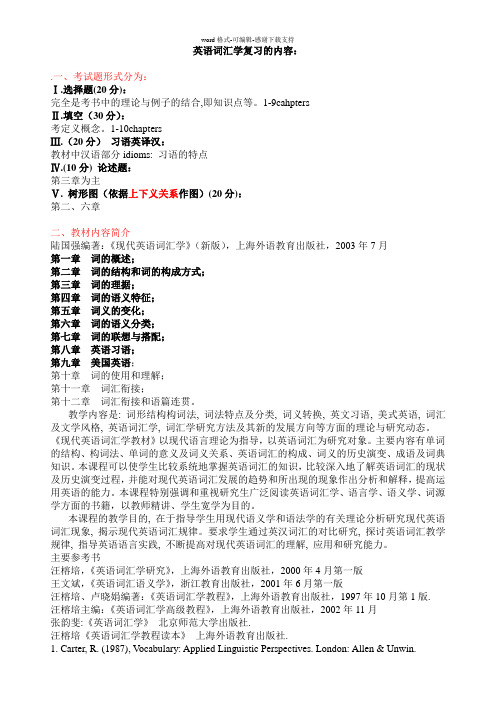
英语词汇学复习的内容:.一、考试题形式分为:Ⅰ.选择题(20分):完全是考书中的理论与例子的结合,即知识点等。
1-9cahptersⅡ.填空(30分):考定义概念。
1-10chaptersⅢ.(20分)习语英译汉:教材中汉语部分idioms: 习语的特点Ⅳ.(10分) 论述题:第三章为主Ⅴ. 树形图(依据上下义关系作图)(20分):第二、六章二、教材内容简介陆国强编著:《现代英语词汇学》(新版),上海外语教育出版社,2003年7月第一章词的概述;第二章词的结构和词的构成方式;第三章词的理据;第四章词的语义特征;第五章词义的变化;第六章词的语义分类;第七章词的联想与搭配;第八章英语习语;第九章美国英语;第十章词的使用和理解;第十一章词汇衔接;第十二章词汇衔接和语篇连贯。
教学内容是: 词形结构构词法, 词法特点及分类, 词义转换, 英文习语, 美式英语, 词汇及文学风格, 英语词汇学, 词汇学研究方法及其新的发展方向等方面的理论与研究动态。
《现代英语词汇学教材》以现代语言理论为指导,以英语词汇为研究对象。
主要内容有单词的结构、构词法、单词的意义及词义关系、英语词汇的构成、词义的历史演变、成语及词典知识。
本课程可以使学生比较系统地掌握英语词汇的知识,比较深入地了解英语词汇的现状及历史演变过程,并能对现代英语词汇发展的趋势和所出现的现象作出分析和解释,提高运用英语的能力。
本课程特别强调和重视研究生广泛阅读英语词汇学、语言学、语义学、词源学方面的书籍,以教师精讲、学生宽学为目的。
本课程的教学目的, 在于指导学生用现代语义学和语法学的有关理论分析研究现代英语词汇现象, 揭示现代英语词汇规律。
要求学生通过英汉词汇的对比研究, 探讨英语词汇教学规律, 指导英语语言实践, 不断提高对现代英语词汇的理解, 应用和研究能力。
主要参考书汪榕培,《英语词汇学研究》,上海外语教育出版社,2000年4月第一版王文斌,《英语词汇语义学》,浙江教育出版社,2001年6月第一版汪榕培、卢晓娟编著:《英语词汇学教程》,上海外语教育出版社,1997年10月第1版.汪榕培主编:《英语词汇学高级教程》,上海外语教育出版社,2002年11月张韵斐:《英语词汇学》北京师范大学出版社.汪榕培《英语词汇学教程读本》上海外语教育出版社.1. Carter, R. (1987), V ocabulary: Applied Linguistic Perspectives. London: Allen & Unwin.2. Carter, R. & M. McCarthy, (1988), V ocabluary and Language Teaching. Harlow; Longman.教学手段:采用多媒体教学本课程要求学生能够比较全面、比较系统地了解现代英语词汇学这一领域的一些最主要、最有影响的语言学理论,能够运用词汇学理论去分析和解决词汇学习中的一些问题。
英语词汇学总结复习资料

大家请注意:笔记中大多数是以名词解释的形式出现的,这些是绝对的基础,应该一字不漏的背下来。
其实不少简答题也就是几个定义的汇总,再加上个例子就可以拿满分了。
区分两个词的区别,主要还是指明其各自的定义。
第一章Basic Concepts of Words and Vocabulary1. 词的定义Word —— A word is a minimal free form of a language that has a given sound and meaning and syntactic function.2.声音与意义的关系There is no logical relationship between sound and meaning as the symbolic connection between them is arbitrary and conventional. E.g. “woman” means ’Frau’ in German,’Femme’ in French and ’Funv ’in Chinese. On the other hand,the same sound /rait/ can mean right,rite and write,though denoting different things,yet have the same sound.3.读音与拼写不一致的原因The difference between sound and form result from 4 major factors.(At least 80%of the English words fit consistent spelling patterns)a). the internal reason is English alphabet does not have a separate letter to represent each sound in the language.b). Pronunciation has changed more rapidly than spellingc). Influence of the work of scribes/printing freezes the spelling of words in 1500d). Borrowing of foreign language4. 词汇的含义Vocabulary —— Vocabulary is most commonly used to refer to the sum total of all the words of a language. It can also refer to all the words of a given dialect,a given book,a given displine and all the words possessed by an individual person as well as all the words current in a particular period of time in history.The general estimate of the present day English vocabulary is over 1 million words.5.词汇的分类的原则Classification of Words—by use frequency,by notion,by originthe English vocabulary consist of words of all kinds. they can be classified by different criteria and for different purpose . words may fall into the word stock and nonbasic vocabulary by use frequency, into content words and functional words by notion , and into native words and borrowed words by origin.基本词汇的特点1). Basic word stock – the foundation of the vocabulary.1.all national character (most important)– natural phenomenamost common things and phenomena of the human body and relationsworld around us names of plants and animals action,size,domain,state numerals,pronouns,prep. ,conj.2. stability– they donate the commonest thing necessary to life,they are like to remain unchanged. Only relative,some are undergoing some changes. But the change is slow.e.g. arrow,bow,chariot,knight – past electricity,machine,car,plane —— now3.productivity– they are mostly root words or monosyllabic words,they can form new words with other roots and affixes.e.g. foot – football,footage,footpath,footer4.polysemy – often possess more than one meaning. Become polysemous.e.g. take to move or carry from one place to another to remove5.collocability– quite a number of set expressions,idiomatic usages,proverbial saying and others基本词汇在英语中的地位和重要性The basic word stock is the foundation of the vocabulary accumulated over centuries and forms the common core of the language .though words of the basic word stock constitute a small percentage of the English vocabulary ,yet it is the most important part of it .e.g. heart – a change of heart, a heart of goldNon-basic vocabulary ——(例子)1. terminology – technical terms used in particular disciplines and academic areas as in medicinephotoscanning,hepatitis,indigestion,penicillin,algebra,trigonometry,calculus2. jargon– specialized vocabulary in certain professions.Bottom line,ballpark figures,bargaining chips,hold him back,hold him in,paranoid3. slang—— substandard words often used in informal occasionsdough and bread,grass and pot,beaver,smoky,bear,catch,holler,Roger,X-rays,Certain words are labeled slang because of their usage.4. argot – words used by sub-cultured groupscan-opener,dip,persuader cant,jargon ,argot are associated with,or most available to,specific groups of the population.5. dialectal words– only by speakers of the dialectbeauty,chook,cocky,station,auld,build,coo,hame,lough,bog6. archaisms – words no longer in common use or restricted in use. In older poems,legal document and religious writing or speech.7. neologism– newly created words with new meaning e.g. microelectronics,futurology,AIDS,internet,E-mailold meaning acquired new meaning e.g. mouse,monitor2). Content word (notional word)– denote clear notions.Functional word (empty word,form word)– do not have notions of their own,express the relation between notions,words and sentences.a. Content words constitute the main body of the English vocabulary are numerous.Functional words are in a small number.b. Content words are growing.Functional words remain stable.c. Functional words do far more work of expression than content words.3). Native words – are words brought to Britain in the 15 century by the German tribes. Ango-Saxon Words,50,000-60,000What is true of the basic word stock is also true of native world. More are1. neutral in style (not stylistical specific )2. 2.frequent in use (in academic fields and science French,Latin or Greek are used)(usage 70-90%)Borrowed words (loan words,borrowing)– words taken over from foreign language. 80%本族语词在英语中的地位和重要性Native words form the mainstream of the basic word stock and stand at the core of the language .therefore , what is true of the basic word stock is also true of native words.According to the degree of assimilation and manner of borrowing,we can bring the loan words under 4 classes.1.Denizen s– words borrowed early and now are well assimilated into English language.e.g. port from portus(L)shift,change,shirt,pork cup from cuppa(L)2.Aliens– retained their original pronunciation and spellinge.g. décor(F)blitzkreeg(G)emir,intermez,rowtow,bazaar,rajar,status quo3.translation loans– formed from the existing material in the English language but modeled on the patterns taken from another language.1). Word translated according to the meaninge.g. mother tough from lingua maternal(L)black humor from humor noir long time no see,surplus value,master piece2). Words translated according to the sounde.g. kulak from kyrak(Russ)lama from lama(Tib)ketchup tea4. Semantic loans– their meaning are borrowed from another languagee.g. stupid old dump new sassy dream old joy and peace pioneer old explorer/person doing pioneering work new a member of the young pioneer fresh old impertinent,sassy,cheeky 第二章The Development of the English1、Indo-European language family (Europe,the Near East,India)It can be grouped into an Eastern set :Balto –Slavic 、Indo-Iranian、Armenian and Albanian; a Western set: Celtic、Italic 、Hellenic、GermanicIn the Eastern set , Armenian and Albanian are each the only modern language respectively,the Balto –Slavic comprises such modern language such as Prussian、Lithuanian、Polish、Czech、Bulgarian、Slovenian、Russian. In the Indo-Iranian we have Persian, Bengali, Hindi, Romany, the last three of which are derived from the dead language Sanskrit.In the Western set, Greek is the modern language derived from Hellenic. In the Celtic,we find Scottish, Irish,Welsh, Breton. the five Romance language ,namely, Portuguese,Spanish, French, Italian, Roumanian all belong to the Italic through an intermediate language called Latin. The Germanic family consist of the four Northern European language :Norwegian, Icelandic, Danish and Swedish, which are generally known as Scandinavian languages. Then there is German, Dutch, Flemish and English.2、History (时间,历史事件,特征)1)Old English (450-1150)totally 50,000-60,000 wordsThe 1st people known to inhabit England were Celts,the language was Celtic.The second language was the Latin of the Roman Legions. The Germanic tribes called angles,Saxons and Jutes and their language,Anglo-Saxon dominated and blotted out the Celtic. Now people refer to Anglo-Saxon as old English. At the end of 6th century,the introduction of Christianity has a great impact on the English vocabulary. The common practice was to create new words by combining two native words. In the 9th century,many Scandinavian words came into English. At least 900 words of Scandinavian are in modern English,our daily life and speech.特点:highly inflected language///complex endings or vowel changes (full ending)2)Middle English (1150-1500)English,Latin,FrenchUntil 1066,although there were borrowings from Latin,the influence on English was mainly Germanic. But the Norman Conquest started a continual flow of French words into English.By the end of the 13th century,English gradually come back into public areas.Between 1250 and 150 about 9000 words of French origin pouered into English. 75% of them are till in use today.As many as 2500 words of Dutch origin come into English.特点:fewer inflections leveled ending3)Modern English (1500-up to now)early modern English (1500-1700)late modern English(1700-up to now)The Renaissance(the early period),Latin and Greek were recognized as the languages of the West ern world’s great literary heritage.From the 1500’s through the 1700’s ,many writers experimented with words. Over 10000 new words entered the English language .many of these were taken from Latin and Greek .The Industrial Revolution was in the mid-17 century. With the growth of colonization,British tentacles began a stretching out of to every corner of the globe,thus enabling English to absorb words from all major languages of the world.After World War II,many new words have been created to express new ideas,inventions and scientific achievements.More words are created by means of word-formation.thousands and thousands of new words have been entered to express new ideas inventions,and scientific achievements.more words are created by means of word-formation.in modern English,word endings were mostly lost with just a few exceptions English has evolved from a synthetic language to the present analytic language.science and technology terms make up about 45% of new words. words associated with life-style constitute of 24% and social and economic terms amount to over 10% .mention should be made of an opposite process of development i.e. old words falling out if use.特点:ending are almost lost.3. Three main sources new words当代英语词汇发展的现状New words sweep in at a rate much faster than at any other historical period of time .词汇发展的主要原因1).The rapid development of modern science and technology2).Social: economic and political changes3).The influence of other cultures and languages4. Three modes of vocabulary development(英语发展的三个主要方式:创造新词、旧词新意、借用外来语词)1. Creation – the formation of new words by using the existing materials,namely roots,affixes and other elements. (This is the most important way of vocabulary expansion.)2. Semantic change - an old form which take on a new meaning to meet the new need.3. Borrowing – to take in words from other languages.(played a vital role in the development of vocabulary , particularly in earlier times)4. (Reviving archaic or obsolete)French 30%,Latin 8%,Japanese Italian 7%,Spanish 6%,German Greek 5%,Russian Yiddish 4%第三章Word Formation*1. Morpheme(词素) ——A morpheme is the smallest meaningful unit of a language. (The smallest functional unit in the composition of words.)*2.Morph——A morpheme must be realized by discrete units. These actual spoken minimal carriers of meaning are morphs.3.Monomorphenic words– morphemes are realized by single morphs.4.Allomorph(词素变体)——Some morphemes are realized by more than one morph according to their position. Such alternative morphs are allomorphemes. E.g. the morpheme of plurality (-s)has a number if allomorphemes in different sound context,e.g. in cats/s/,in bags/z/,in matches/iz/.5. Free morphemes or Free root —— The morphemes have complete meaning and van be used as free grammatical units in sentences,e.g. cat,walk. They are identical with root words. morphemes which are independent of other morphemes are considered to be free.6.Bound Morphemes——The morphemes cannot occur as separate words. They are bound to other morphemes to form words,e.g. recollection (re+collect+ion)collect – free morpheme re-and –ion are bound morphemes. (include bound root and affix)Bound morphemes are found in derived words.7.Bound root —— A bound root is that part of the word that carries the fundamental meaning just like a free root. Unlike a free root,it is a bound form and has to combine with other morphemes to make words. Take -dict- for example:it conveys the meaning of “say or speak” as a Latin root,but not as a word. With the prefix pre-(=before)we obtain the verb predict meaning “tell beforehand”。
英语词汇学复习资料
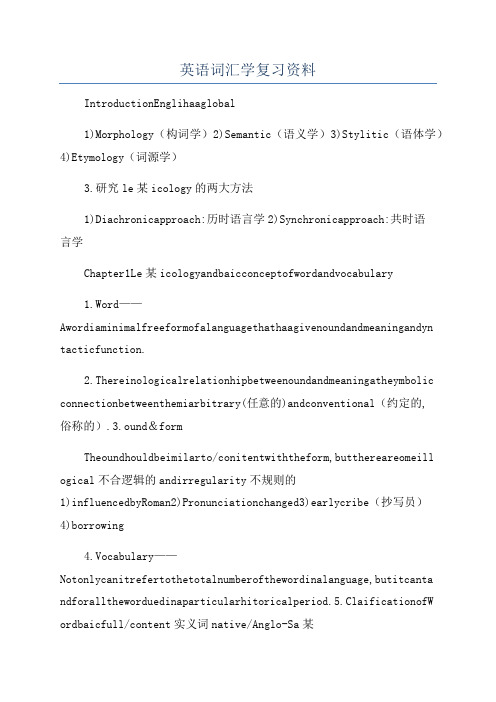
英语词汇学复习资料IntroductionEnglihaaglobal1)Morphology(构词学)2)Semantic(语义学)3)Stylitic(语体学)4)Etymology(词源学)3.研究le某icology的两大方法1)Diachronicapproach:历时语言学2)Synchronicapproach:共时语言学Chapter1Le某icologyandbaicconceptofwordandvocabulary1.Word——Awordiaminimalfreeformofalanguagethathaagivenoundandmeaningandyn tacticfunction.2.Thereinologicalrelationhipbetweenoundandmeaningatheymbolic connectionbetweenthemiarbitrary(任意的)andconventional(约定的,俗称的).3.ound&formTheoundhouldbeimilarto/conitentwiththeform,butthereareomeill ogical不合逻辑的andirregularity不规则的1)influencedbyRoman2)Pronunciationchanged3)earlycribe(抄写员)4)borrowing4.Vocabulary——Notonlycanitrefertothetotalnumberofthewordinalanguage,butitcanta ndforalltheworduedinaparticularhitoricalperiod.5.ClaificationofW ordbaicfull/content实义词native/Anglo-Sa某onwordfrequencynotionoriginnonbaic/vocabularyfunctional/empty功能词borrowed/loanCollocability(可搭配性)neutralintyle(中立性)(2)Twofeatureofnativewordfrequentinue1)wordtakenoverfromforeignlanguageareknowaborrowedwordorloan wordorborrowinginimpleterm.2)ItietimatedthatEnglihborrowingconti tute80percentofthemodernEnglihvocabulary3)TheEnglihlanguagehavat debt.Inanydictionaryome80%oftheentrieareborrowed.Chapter2ThedevelopmentoftheEnglihvocabulary1.OldEnglih属于Indo-Europeanlanguagefamily(印欧语系)——Germanic(日耳曼语系),与德语最相似.2.Hitory1)OldEnglih(450-1150)a.Thefirtpeopleknowntoinhabit(居住)EnglandwereCelt,thelanguagewaCeltic(凯尔特语).b.TheecondlanguagewatheLatin(拉丁语)oftheRomanLegion(罗马军队).Romaninvaion→Anglo-Sa某on 三个事件TheintroductionofChri tianity→拉丁文的涌入Vikinginvaion(北欧海盗)andScandinavian斯堪的纳维亚语传入word文档可自由复制编辑2)MiddleEnglih(1150-1500)在英语发展过程在哪个阶段出现三语鼎立的现象?French,Latin,EnglihinMiddleEnglihperiodeael,port,freight,出现于英语发展的哪个阶段,属于哪一种外来词的引入?MiddleEnglih,Dutch(带来了2500个词汇)3)ModernEnglih (1500-uptonow)TheRenaiance(文艺复兴):LatinandGreekwererecognizedathelanguageoftheWeternworld’gr eatliteraryheritage(文化遗产).TheIndutrialRevolution(工业革命):17世纪中期Withthegrowthofcolonization(殖民化),Britihtentacle(魔爪)beganatretchingoutoftoeverycorneroftheglobe,thuenablingEnglihtoaborb(吸收)wordfromallmajorlanguageoftheworld.十六世纪,有一种新工业Printing出现对词汇的发展产生重要的影响,这导致oundandform出现concord(一致)和tandardization第二次世界大战以后,大量外来词进入英语中,如:Maojacket,blackbelt,kongfu标准化Inflectionallanguage屈折语Analyticallanguage分析语TherapiddevelopmentofmoderncienceandtechnologySocial,economi candpoliticalchangeTheinfluenceofothercultureandlanguageThreemodeofvocabularyde velopmentChapter3ThetructureofEnglihwordword.)Free→cantandaloneaaword/independentofothermorphemeTypeprefi某ation前缀Le某ical→derivational→affi某ationBound→addedtoothermorphemeuffi某ation后缀Grammatical→inflectional2.Morph——Amorphememutberealizedbydicrete(离散的)unit.Theeactualpokenminimalcarrierofmeaningaremorph.Monomorpheni cword——morphemearerealizedbyinglemorph.Allomorph(词素变体)——Somemorphemearerealizedbymorethanonemorphaccordingtotheirpoition .3.Root——Arootithebaicformofaword,whichcannotbefurtheranalyzedwithouttota lloofidentity.(Whatremainofawordaftertheremovalofallaffi某e.)Stem——aformtowhichaffi某eofanykindcanbeadded.Bae——refertoaformtowhichaffi某eofanykindcanbeadded.Itcanbearootortem.atemmayconitofainglerooto rtworootandarootpluaaffi某.atemcanbearootoraformbiggerthanaroot.请加以区别下面两个词的特征:nation,dict加以理论的分析(1)Bothnationanddictbelongtoroot,nationifreeroot,whichcanfun ctionaloneinaentence,Chapter4Word-formationinEnglih1.Therearefourmaintypeofword-formationinEnglih.word文档可自由复制编辑(1)★Affi某ation(prefi某ationanduffi某ation)构词能力最强Affi某ationigenerallydefinedatheformationofwordbyaddingwordformingorde rivationalaffi某etotem.fullconverion——Itcantakeanindefinitarticle(不定冠词)or-(e)toindicateingularorpluralnumber.e.g.black→ablackdrinkable→d rinkablepartialconverion——mutbeuedtogetherwithdefinitearticle.e.g.rich→therich2.Othertype ofword-formation(1)Clipping/hortening——hortenalongerwordbycuttingapartoftheoriginanduingwhatremainintea d.quake(earthquake)dorm(dormitory)pop(popularmuic)flu (influenza)(2)Acronymy首字母缩略法——joiningtheinitialletterofnameofocialandpoliticalorganizationorpe cialphraeandtechnicaltermeg:VOA-VoiceofAmericaTV-televiion绝大多数blending都是nouneg:mog(烟雾)frommoke+fogtele某(电传机)fromteleprinter+e某changeMedicare(医疗保险)frommedical+carelunarnaut(登月宇航员)fromlunar+atronaut(4)Back-formation逆构词法——iaproceofword-formationbywhichawordicreatedbythedeletion删除ofauppoedaffi某.donate(donation)loaf(loafer)babyit(babyitter)laze(lazy)Chapter5Wordmeaning1.Analytical(referential)分析的Reference–therelationhipbetweenlanguageandtheworld.Operational(conte某tual)运用到具体场景中Concept–whichbeyondlanguageithereultofhumancognitionreflectingthe objectiveworldinthehumanmind★Sene1)enedenotetherelationhipinidethelanguage.Theeneofane某preioniitplaceinaytemofemanticrelationhipwithothere某preioninthelanguage.’2)Sincetheeneofane某preioninotathing,itioftendifficulttoaywhatortofidentityiti.Itial oanabtraction.3)Everywordthathameaninghaene(noteverywordhareference)2.Motivation(理据)——accountfortheconnectionbetweenthelinguitic(语言学的)ymbolanditmeaning.non-motivatedOnomatopoeic(拟声的)——thewordwhoeounduggettheirmeaning.Semantic(语义学的)——refertothementalaociationuggetedbytheconceptual概念上的meaningofaword.eg:atthefootofmountain,themouthofriverword文档可自由复制编辑Etymological(词源学的)——Thehitoryoftheworde某plainthemeaningoftheword.3.TypeofmeaningGrammatical语法–refertothatpartofthemeaningofthewordwhichindicategrammaticalconc eptorrelationhipConceptual概念——themeaninggiveninthedictionaryandformthecore核心ofword-meaning.Le某ical词汇Connotative内涵意义eg:Mother—afemaleparent—loveAociative联想Stylitic语体1)formal2)neutral3)informalAffective/Emotive——appreciativeandpejorativeCollocative固定搭配Chapter6SenerelationSynchronicapproachRadiation辐射像车轮式一样进行发展的语义e.g.face,neck(3)TwoproceofdevelopmentConcatenation–meaning―linkingtogether‖串联 2.Homonymy(1)定义:Homonymaregenerallydefinedaworddifferentinmeaningbuteitheridenti cal(完全相同的)bothinoundandpellingoridenticalonlyinoundorpelling.PerfectHomonym同音同形异义词e.g.bear忍受;熊ball球;舞会(2)TypeHomograph同形异义e.g.minute分钟;微小的(1)定义:Synonymareworddifferentinoundandpellingbutmotnearlyalikeore某actlytheameinmeaning.Aboluteregioned地域(BritihEnglih&AmericanEnglih)(2)TypetyliticdegreeRelative(Near)hadeofmeaningemotiverangecollocative搭配Borrowing(themotimportantource)(1)定义:Antonymyiconcernedwithemantic语义学的oppoition.Relative(dependoneachother)eg:parent—child,ell—buy,predeceor前辈—ucceor继承者word文档可自由复制编辑(3)Characteritic1)Antonymareclaifiedonthebaiofemanticoppoition.2)Awordwhichhamorethanonemeaningcanhavemorethanoneantonym.3)Antonymdifferinemanticincluion.4)Contrarytermaregradableantonym,differingindegreeofintenity,oeach haitowncorrepondingoppoition.(4)Ue。
英语词汇学课件chapter-8-Meaning-and-Context
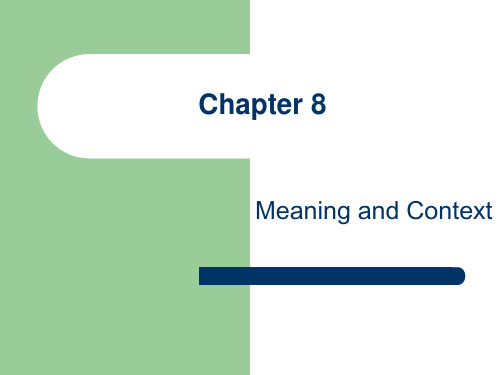
1) a sheet of paper (thin flat sheets of substance for writing, printing, decorating walls, etc.)
2) a white paper (government document)
3) a term paper (essay written at the end of the term)
(1) The fish is ready to eat. (2) I like Mary better than Jean.
8.2.2 Indication of Referents
English has a large number of deictic(指示的) words such as now/then, here/there, I/you, this/that, which are often used to refer directly to the personal, temporal or locational characteristics of the situation. Without clear context, the reference can be very confusing, e.g. now.
4) today’s paper (newspaper)
5) examination paper (a set of questions used as an examination)
2) Grammatical Context
In some cases, the meanings of a polysemant may be influenced by the structure in which it occurs. This is what we call grammatical context. Let us consider the verb become for example.
(完整word版)现代英语词汇学概论最强版复习资料chapter2英语词汇的形态结构
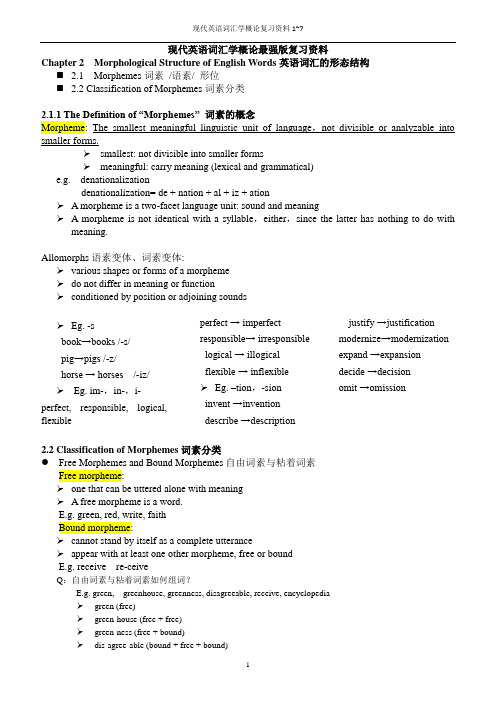
现代英语词汇学概论复习资料1~7现代英语词汇学概论最强版复习资料Chapter 2 Morphological Structure of English Words英语词汇的形态结构⏹ 2.1 Morphemes词素/语素/ 形位⏹ 2.2 Classification of Morphemes词素分类2.1.1 The Definition of “Morphemes” 词素的概念Morpheme: The smallest meaningful linguistic unit of language,not divisible or analyzable into smaller forms.➢smallest: not divisible into smaller forms➢meaningful: carry meaning (lexical and grammatical)e.g. denationalizationdenationalization= de + nation + al + iz + ation➢ A morpheme is a two-facet language unit: sound and meaning➢ A morpheme is not identical with a syllable,either,since the latter has nothing to do with meaning.Allomorphs语素变体、词素变体:➢various shapes or forms of a morpheme➢do not differ in meaning or function➢conditioned by position or adjoining sounds➢Eg. -sbook→books /-s/pig→pigs /-z/horse → horses /-iz/➢Eg. im-,in-,i- perfect, responsible, logical, flexible perfect → imperfectresponsible→ irresponsiblelogical → illogicalflexible → inflexible➢Eg. –tion,-sioninvent →inventiondescribe →descriptionjustify →justificationmodernize→modernizationexpand →expansiondecide →decisionomit →omission2.2 Classification of Morphemes词素分类●Free Morphemes and Bound Morphemes自由词素与粘着词素Free morpheme:➢one that can be uttered alone with meaning➢ A free morpheme is a word.E.g. green, red, write, faithBound morpheme:➢cannot stand by itself as a complete utterance➢appear with at least one other morpheme, free or boundE.g. receive re-ceiveQ:自由词素与粘着词素如何组词?E.g. green, greenhouse, greenness, disagreeable, receive, encyclopedia➢green (free)➢green-house (free + free)➢green-ness (free + bound)➢re-ceive (bound + bound)➢en-cyclo-pedia (bound + bound + bound)* A free morpheme is a word.●Roots and Affixes词根与词缀Root 词根: The basic unchangeable part of a word, and it conveys the main lexical meaning of the word.➢ 1. Free root (自由词根):A word consist of one free root (or one morpheme)is a simple word.Free roots provide the English language with a basis for the formation of new words.➢ 2. Bound root(粘着词根):roots derived from foreign sources ,esp. from Greek and Latin, belong to the class of bound morphemes, such as tian and cieveEg.1)work, workable, worker, worked, working (free)2) contain, detain, retaintain= tenere (L) = to hold (bound)3) conceive, deceive, receiveceive= capere (L) = to take (bound)4) revive, vitamin, vital, vivacious, vividvit, viv = life / to live (bound)➢Vital:necessary in order to stay alive-al: pertaining to = have a connection withvital = having a connection with life Vivacious:adj. apprec. full of life and high spirits; lively-ous: full ofvivacous = full of life (energy)Vivid:producing sharp clear pictures in the mind; lifelike-id: having a certain qualityvivid = having a certain quality of lifeAffixes缀: a collective term for the type of formative that can be used when added to another morpheme.➢ 1. Inflectional affixes(屈折词缀): serves to express such meanings as plurality, tense, and the comparative or superlative degree.特点:1.not to form a new word with new lexical meaning2. having only particular grammatical meaning3. only to be affixed to words of the same word-class (not to change the word-class)➢ E.g. Plural marker: pens, oxen, feetGenitive case: Jame’sVerbal endings: works, working, worked, bought, saidComparative and superlative degree: slower, slowest➢ 2. Derivational affixes(派生词缀):to be added to another morpheme to derive a new word 特点:1. to derive a new word2. having a specific lexical meaning (some also affective meaning)3. some to be attached to words of different word classes➢Eg. Having pejorative or derogatory meaning-ism means“doctrine or point of view ”==socialismPro-means“on the side of ”==pro-com-munist⏹Mini-carmean-nessModern-izeSocial-ism Pro-communist De-codeDe-valueWash-able⏹mis-mal-absorptionpseudo-democratic hire-ling weak-ling child-ish派生词缀分类(derivational morphemes): Prefixes and suffixes1) By linguistic origin:➢Native affixes➢Foreign affixes2) By productivity:➢Productive/living affixes➢Unproductive/dead affixes➢Summary➢ 2.Morphological Structure of English Words英语词汇的形态➢ 2.1 Morphemes词素➢ 1.The Definition of “Morphemes”词素的概念➢ 2. Allomorphs 词素变体➢ 2.2 Classification of Morphemes 词素分类➢ 1. Free Morphemes and Bound Morphemes➢自由词素与粘着词素➢ 2. Roots and Affixes 词根与词缀➢free root and bound root自由词根与粘着词根➢inflectional affixes and derivational affixes屈折词缀与派生词缀➢➢。
现代词汇学 Chapter 8

The constituents cannot be deleted or added to. Diamond cut diamond. * A diamond cuts diamond. out of the question = impossible * out of question = impossible out of question = undoubtedly
(2)
The part of speech of each element is no longer important.
Semantic Unity
(3) Many idioms are semantically inexplicable.
“ How do you do ” intends to ask “ In what way How do do you do things ?” No! It is a common form of you do? greeting used by people when they first meet!
IDIOMATICITY
3.
Somewhat idiomatic: drink like a fish 牛饮 keep silence 沉默 as cold as ice 冰冷 The meaning is transparent.
III. CLASSIFICATION OF IDIOMS
IDIOMATICITY
2.
Semi-idiomatic: turn over a new leaf 改过自新 once in a blue moon 千载难逢 draw the curtain 隐蔽/藏 The meaning can be deduced to a certain extent.
[英语考试]高等教育自学考试英语词汇学第一章到第八章必背考点
![[英语考试]高等教育自学考试英语词汇学第一章到第八章必背考点](https://img.taocdn.com/s3/m/f7329d204028915f804dc2ef.png)
• English, Latin and French existed side by side. • Middle English was one of leveled endings.
• 3 Modern English Period (1500-now):
vocabulary
• Vocabulary --- all the words in a language make up its vocabulary .
• The general estimate of the present-day English vocabulary is over 1 million words.
Non-basic vocabulary --
• (1)Terminology(术语) • (2)Jargon(行话) • (3)slang(俚语) • (4)Argot(暗语) • (5)Dialectal words(方言) • (6) Archaisms(古语) • (7) Neologisms(新词语)
• Morpheme(词素)---the minimal meaningful unit of a language.
3.3 types of morphemes
• Free morphemes (自由词素) • Bound morphemes (粘附词素)
• a free morpheme refers to a morpheme that can stand alone.
• bound morpheme refers to a morpheme that accurs with at least one other morpheme.
现代英语词汇学概论复习(Chapter1-10)
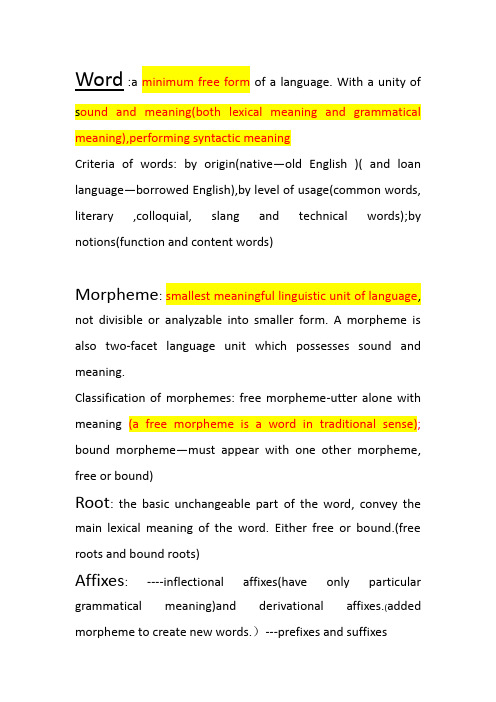
Word :a minimum free form of a language. With a unity of s ound and meaning(both lexical meaning and grammatical meaning),performing syntactic meaningCriteria of words: by origin(native—old English )( and loan language—borrowed English),by level of usage(common words, literary ,colloquial, slang and technical words);by notions(function and content words)Morpheme: smallest meaningful linguistic unit of language, not divisible or analyzable into smaller form. A morpheme is also two-facet language unit which possesses sound and meaning.Classification of morphemes: free morpheme-utter alone with meaning(a free morpheme is a word in traditional sense); bound morpheme—must appear with one other morpheme, free or bound)Root: the basic unchangeable part of the word, convey the main lexical meaning of the word. Either free or bound.(free roots and bound roots)Affixes: ----inflectional affixes(have only particular grammatical meaning)and derivational affixes.(added morpheme to create new words.)---prefixes and suffixesWord-formationThree major processes : compounding(joining tow or more bases to form a new unit of compound words)Derivation(forming a new word by addition of a word element)Conversion(a word of certain word-class is shifted into another word-class without any affixes)Eight minor processes :Acronymy (Initialisms –using the first letter from proper name ,phrase, technical words)Ainitialism is pronounced letter by letter) and acronyms—from the initial letters of the name of an organization or scientific term)==are pronounced as words.Clipping(deletion of one or more syllables from a word—usually a noun, which is also available in its full form)Classification—back clipping, front clipping ,front and back clipping and phrase clipping.)Blending---formed by combining the meanings and sound of tow words.one of which is not full form or both of which are not full form. )不完整拼缀Back-formation(coined by the deletion of a supposed affix from a longer form already present in the language.)Words from proper names(including names of scientists, names of politicians and statesman, names of places, trademark, literature)Reduplication(a compound word is created by the repetition(1)of one word like go-go(2)almost identical words with a change in the vowel’s such as ping-pong.(3)of two almost identical words with a change in the initial consonants ,as in teenyweeny.Neoclassical(new words are formed from elements derived from Latin and Greek)The majority of neoclassical formations are scientific and technical.MiscellaneousWord meaning and sense relations1,conventionality—no way to explain why this or that sound-symbol and its sense.2,motivation—phonetic ,morphological, sematic3,main types of word meaning(interrelated andinterdependent)---class and inflectionalparadigm)andmeaning; connotative meaning—emotional association; social or stylistic meaning and affective meaning)Binary opposites.二相对立Polysemy—a term used in sematic analysis to refer to lexical item which has a range of meanings.)T wo approaches—diachronic and synchronic.---primary meaning and derived meaning, central meaning and secondary meaning(in some cases, the primary meaning and the central meaning coincide.)Two processes leading to polysemy---radiation(each of the secondary meanings may become a center of further radiation),concatenation(linking together, like the links of a chain.Homonymy(---pronounced alike, spell alike, or both.)---types of homonyms(perfect homonyms—word identical in sound and spelling but different in meaning)(Homophones---identical in sound but different in spelling and meaning.)(Homographs—identical in spelling but different in sound and meaning.)Polysemic and homonymous words are stylistically useful to achieve humour or irony, or to heighten dramatic effect. Synonymy(—identical in meaning but different in sound and spelling.)--- Complete synonyms(absolute),Relative synonyms.Antonymy (--opppsiteness of meaning)---contrary, complementary and conversives ….Antonyms classified on the basis of morphological structure: root antonyms and derivational antonyms.Marked and unmarked words---subsume.(Marked members can not be used to include unmarked member.) Hyponymy—(relationship which obtains specific and general lexical items)Superordinate term(an upper term),Subordinate terms(a lower term)===hierarchical system Sematic field---is not simply a listing of independent items, organized into areas or field.Charateristic of the same sematic field.1),word frequency in the same semantic varies 2)these words are semantically interdepent.3) words in the same semantic field are likely to have a number of collocation on common. Changes in word meaning---1,causes:historical,social,foreign influence, linguistic and psychological .2, Four tendencies in sematic change---restriction, extension, degeneration, elevation (of meaning)具体化,普遍化,语义转贬,语义改良。
英语词汇学chapter 8 social meaning

oft(often);
albeit (although) thither( there)
theretofore (up to that time)
save (except) perchance ( perhaps)
感叹词
(1) Ay yaaah! 常在说话人生气时使用,例如: Ay yaaah! You made the same mistake again!
(2) Ay yor! 常用来表示“痛苦”、“惊讶” 等,例如:
Ay yor! How can you do such a foolish thing ?
Variation according to:
Dialect (the language of geographical region or of a social class) Time (the language of the eighteenth century, etc.)
Province (language of law, of science, of advertising, etc.)
British English: a thick, sticky food made from oats cooked
in water or milk, or to which sugar is added
Mutton chop
Singapore English: Chopped-up lumps of meat with no bone
No need to count la. There are 30
students la. (2) 表达一种委婉的建议,例如:
Chapter-8--English-Idioms-英语词汇学-教学课件
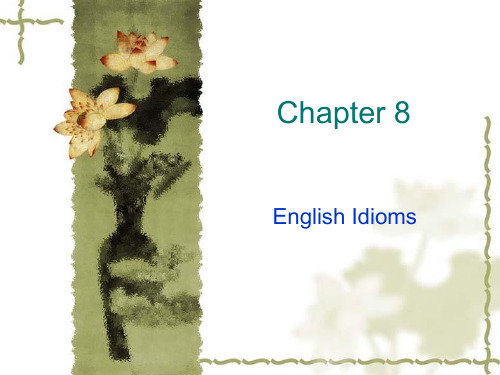
Stylistic Features
❖ idioms are generally felt to be informal and some are colloquialisms and slang, therefore inappropriate for formal style. Occasionally, we find idioms which are extremely formal and used only in frozen style.
Idiomaticity
❖ The fixity of idioms depends on the idiomaticity. The more idiomatic the idioms, the more fixed the structure.
❖ Many of the idioms of the lower scale do allow some changes.
❖ In between we have idioms like turn over a new leaf, as cool as a cucumber and draw the curtain , whose meanings are in a way related to the meanings of the constituents but are themselves explicit.
colloquialisms, catchphrases, slang expressions, proverbs, etc ❖ This chapter will deal with idioms in terms of their characteristics, classification and uses.
8.现代英语词汇学(第八章)
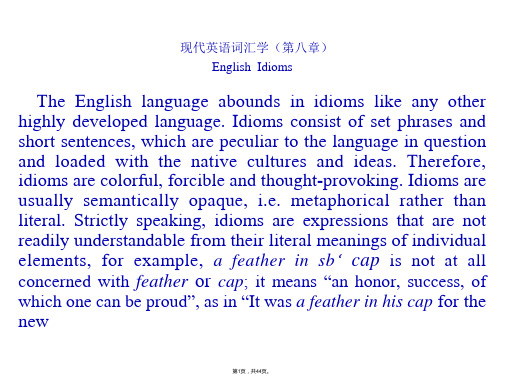
their respective literal meanings, in the idiom they have lost their individual identity, i.e. their meanings are not often recognizable in the meaning of the whole idiom. Likewise, the part of speech of each element is no longer important. Quite often the idiom functions as a unit of meaning which cannot be predicted from the literal meaning of its member words. For instance, till the
into * by threes and twos and * tat for tit. Similarly the lion’s share is not to be replaced by the share of the lion though it is a
common practice in free phrases.
as free phrase, we can say in a brown ( red, green, white, etc.) study. However, as an idiom to mean “deep in thought”, the structure is fixed. In the same way, lip service (support only in words, not in fact) is not to be changed in * mouth service; kick the bucket (die) cannot be changed into * kick the pail or * strike the bucket; bury the hatchet (come to friendly or peaceful terms) is not to be turned into *bury the ax. Secondly, the word order cannot be inverted or changed. For example, by twos or threes and tit for tat are not to be turned
自考英语词汇学部分章节重点归纳复习专供

《英语词汇学》(课程代码: 00832)试卷结构Chapter 5 Word Meaning(词的意义)Reference(所指关系) is the relationship between language and the world.Concept(概念), nguage.i.th.resul.o.huma.cognitio.n.认识;知识;认识能力.reflectin.th.objectiv.worl.i.th.huma.mind.Sense(语义)nguage.Ever.wor.tha.ha.meanin.ha.sens.( no.ever.wor.ha.reference)Motivation(词义理据)account for the connection between the linguistic(word) symbol and its meaning.Onomatopoeic motivation(拟声理据) words were created by imitating the nature sounds or noises.Morphological motivation(形态理据)compounds and derived words are multi-morphemic words and the meanings of many are the sum total of the morphemes combined.很多合成词和派生词都是这类,Semanti.motivation(语义理据)refer.t.th.menta.association.suggeste.b.th.conceptua.meanin.o..word.I.ex plain.th.connectio.betwee.th.litera.sens.an.figurativ.sens.o.th.word.(由字面义派生出来的引申义)Etymologica.motivation(词源理据.th.meanin.o.man.word.ofte.relat.directl.t.thei.origins.I.othe.word.th.histor .o.th.wor.explai.th.meanin.o.th.word.Grammatical meaning refers to that part of the meaning of the word which indicates grammatical concept or relationships.Conceptual meaning also known as denotative meaning(外延意义),is the meaning given in the dictionary and forms the core of word-meaning. Associative meaning is the secondary meaning supplemented to the conceptual meaning.Connotative meaning refers to the overtones or associations suggested by the conceptual meaning, traditionally know as connotations.Stylistic meaning refers to stylistic features, which make them appropriate for different contexts.Affective meaning indicates the speaker’s attitude towards the person or thing in question.(appreciative or pejorative).Collocative meaning is that part of the word-meaning suggested by the words before or after the word in discussion.Stylistic meaning and affective meaning are revealed by means of collocations.Chapter 6 Sense Relations and Semantic Field(语义关系和语义场)6.1 Polysemy(多义关系)1. 多义关系的形成: Polysemy is a common feature peculiar to all nature language that a word has more than one sense.A.overwhelmin.majorit.o.word.ar.polysemous.Whe..wor.i.firs.coined.i.i.alway e.t.expres. mor.meanings.Th.resul.i.polysemy.2.Two approaches to polysemy(多义关系的两种研究方法):diachroni.approach(历时角度)an.synchroni.approach(共时角度).3.Two process of development(词义发展的两种模式)1)Radiatio.(辐射型.i..semanti.proces.i.whic.th.primar.meanin.stand.a.th.cen te.an.th.secondar.meaning.procee.ou.o.i.i.ever.directio.lik.rays.Th.meaning. ar.independen.o.on.another.Bu.ca.al.b.trace.bac.t.th.centr.meanin..2)Concatenation(连锁型).meanin.‘linkin.together’.i.th.semanti.proces.i.whic.th.meanin.o..wor.move.graduall.awa.fro.it.firs.sens.b.successiv.adj.连续的;继承的;依次的;接替.shifts.6.2 Homonymy(同形spelling同音sound异义meaning关系)6.2.1Types of homonyms1.Perfect homonyms(完全同形同音异义词)are words identical both in soundand spelling, but different in meaning.2.Homographs(同形词) are words identical only in spelling but different in sound and meaning .3.Homophones(同音词)ar.word.identica.onl.i.soun.bu.differen.i.spellin.an.meaning.Homophone.c mon.6.2.2 Origins of Homonyms1.Chang.i.soun.an.spelling.2.Borrowing.3.Shortening.6.2.3 Differentiation of homonyms and polysemants(同形同异义词与多义词的区别)They are fully identical with regard to spelling and pronunciation.6.2.4 Rhetoric features of homonyms(同形同音异义词的修辞特色)6.3 Synonymy(同义关系)—2类型+4来源+3区分1.Definition of synonyms(同义词的定义):words different in sound and spelling but most nearly alike or exactly the same in meaning.2.同义词的2个分类1)absolute synonyms(完全同义词) also known as complete synonyms are words which are identical in meaning in all its aspects.2)relative synonyms(相对同义词)also called near-synonyms are similar or nearly the same in denotation, embrace different shades of meanings or different degree of a given quality.3.同义词的4个来源1.Borrowing.(外来词)2) Dialects and regional English.(方言和区域性的英语).o.words.(词的引申义和委婉语用法)4.Coincidenc.wit.idiomati.expressions.(与习惯表达巧合一致)4.同义词的辨析(3个区分)1)difference in denotation.(外延意义)2)difference in connotation.(the stylistic and emotive colouring of words) (内涵意义)3)differenc.i.application.应用上(age.differen.collocations)6.4 Antonymy反义关系—semantic opposition(语义相反关系)1.反义词的分类: 矛盾反义词、对立反义词和关系反义词1) Contradictory terms (exclusive and non-gradable)--oppositeness2.Contrar.terms.(p ariso.wit.th.other.)—semanti.relativity3) Relative terms.(interdependent相互依存)—relational opposites2.三类反义词的特点和区别Some of the characteristics of antonyms1)Antonym.ar.classifie.o.th.basi.o.semanti.opposition.(adj.v.n.)ther.ar.mor.synonym.tha.antonyms.2) A word which has more than one meaning can havemore than one antonym.3)Antonym.diffe.i.semanti.inclusion.Pair.o.antonym.ar.see.a.marke.an.unmarke.term.respectively.Contrar.term.ar.gradabl.antonyms.differin.i.degre.o.intensity.s.eac.ha.it.ow.correspondin.opposite.Som.word.ca.hav.tw.differen.type.o.antonym.a.th.sam.time.on.bein.th.negativ.an.th.othe.opposite.3.使用: 解释词义。
(完整word版)现代英语词汇学概论最强版复习资料chapter8
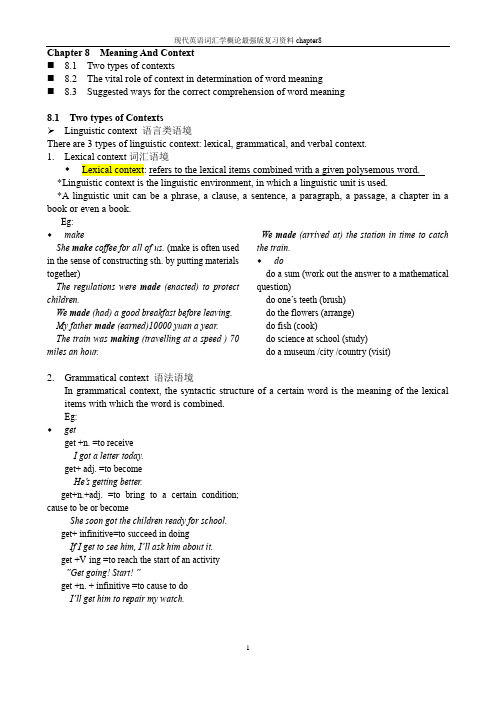
*Linguistic context is the linguistic environment, in which a linguistic unit is used.
Extra-linguistic context /Context of situation语言外或情景语境
1.The actual speech situation in which a word (or an utterance, or a speech event) occurs.
*In daily life, word meaning is more often dependent on the actual situation in which a word is used rather than on verbal context.
do fish (cook)
do science at school (study)
do a museum /city /country (visit)
2.Grammatical context语法语境
In grammaticalcontext, thesyntactic structure of a certain word is the meaning of the lexical items with which the word is combined.
8.1 Two types of Contexts
Linguistic context语言类语境
There are 3 types of linguisticcontext: lexical, grammatical, and verbal context.
- 1、下载文档前请自行甄别文档内容的完整性,平台不提供额外的编辑、内容补充、找答案等附加服务。
- 2、"仅部分预览"的文档,不可在线预览部分如存在完整性等问题,可反馈申请退款(可完整预览的文档不适用该条件!)。
- 3、如文档侵犯您的权益,请联系客服反馈,我们会尽快为您处理(人工客服工作时间:9:00-18:30)。
Chapter 8 Meaning And Context⏹8.1 Two types of contexts⏹8.2 The vital role of context in determination of word meaning⏹8.3 Suggested ways for the correct comprehension of word meaning8.1 Two types of Contexts➢Linguistic context 语言类语境There are 3 types of linguistic context: lexical, grammatical, and verbal context.1.Lexical context词汇语境♦Lexical context: refers to the lexical items combined with a given polysemous word.*Linguistic context is the linguistic environment, in which a linguistic unit is used.*A linguistic unit can be a phrase, a clause, a sentence, a paragraph, a passage, a chapter in a book or even a book.Eg:♦makeShe make coffee for all of us. (make is often used in the sense of constructing sth. by putting materials together)The regulations were made(enacted) to protect children.We made (had) a good breakfast before leaving. My father made (earned)10000 yuan a year.The train was making (travelling at a speed ) 70 miles an hour.We made (arrived at) the station in time to catch the train.♦dodo a sum (work out the answer to a mathematical question)do one’s teeth (brush)do the flowers (arrange)do fish (cook)do science at school (study)do a museum /city /country (visit)2.Grammatical context 语法语境In grammatical context, the syntactic structure of a certain word is the meaning of the lexical items with which the word is combined.Eg:♦getget +n. =to receiveI got a letter today.get+ adj. =to becomeHe’s getting better.get+n.+adj. =to bring to a certain condition;cause to be or becomeShe soon got the children ready for school.get+ infinitive=to succeed in doingIf I get to see him, I’ll ask him about it.get +V-ing =to reach the start of an activity‘‘Get going! Start! ’’get +n. + infinitive =to cause to doI’ll get him to repair my watch.3.Verbal context 文本语境Verbal context :In addition to lexical, and grammatical context, the verbal context, in its broadest sense, may cover an entire passage, or even an entire book, and in some cases even the entire social or cultural setting ,as start in the beginning of the chapter.➢Extra-linguistic context /Context of situation 语言外或情景语境1.The actual speech situation in which a word (or an utterance, or a speech event)occurs.*In daily life, word meaning is more often dependent on the actual situation in which a word is used rather than on verbal context.2.The entire cultural background against which a word, or an utterance or a speechevent has to be set.Eg. Pansant, farmer ,farm worker农民Liberalism 自由主义8.2 The Vital Role of Context in Determination of Word Meaning➢Eliminating ambiguities 消除词汇歧义和结构歧义Ambiguity refers to a word ,phrase ,sentence or a group of sentences with more than one possible interpretation or meaning.*Several types:1)PolysemyEg. The damage was done by the river.(by=beside/through the agency, means, or instrumentality of)=The damage was done beside the river.=The damage brought about the damage.2)Structural ambiguity arising from the grammatical analysis ofa sentence or a phrase.Eg. Young men and women-young/men and women/( both are young)-/young men /and women( only men are young)I like Bill more than Mary.-I like Bill more than Mary does.-I like Bill more than I like Mary.➢Conveying emotional overtones 传达感情色彩The emotive side of word meaning depends largely on the context, with the exception of those words that have affective meaning as part of word meaning.Eg. niceYou’ve got us into a nice mess.(bad)-is ironic and acquires an unfavourable sense.*Only the context can show whether a word should be taken as a purely objectiveexpression, whether it conveys and evokes emotions, or whether an appreciative word is used in an unfavourable way.➢Indicating referents and the range of the meaning of a word 明确词义的指代和广度Pronouns (like I, you, he, she, this or that) are often used instead of a noun or a noun phrase;do, can, or should can be used in place of a verb phrase, and then, or there is used in place of an adverbial phrase of time or place.Eg. Man is mortal.( the whole of mankind)Man is taller than woman.( only the male half of the human race)8.3 Suggested ways for the correct comprehension of word meaningA.The use of an up-to-date and adequate monolingual dictionary使用一本最新的、内容足够丰富的单一语种词典B. A good knowledge of the culture of the English-speaking people对英语国家人民的文化有很好的理解C.Development of the ability to determine the meaning of a word from itscontext培养自己通过语境去理解词义的能力。
